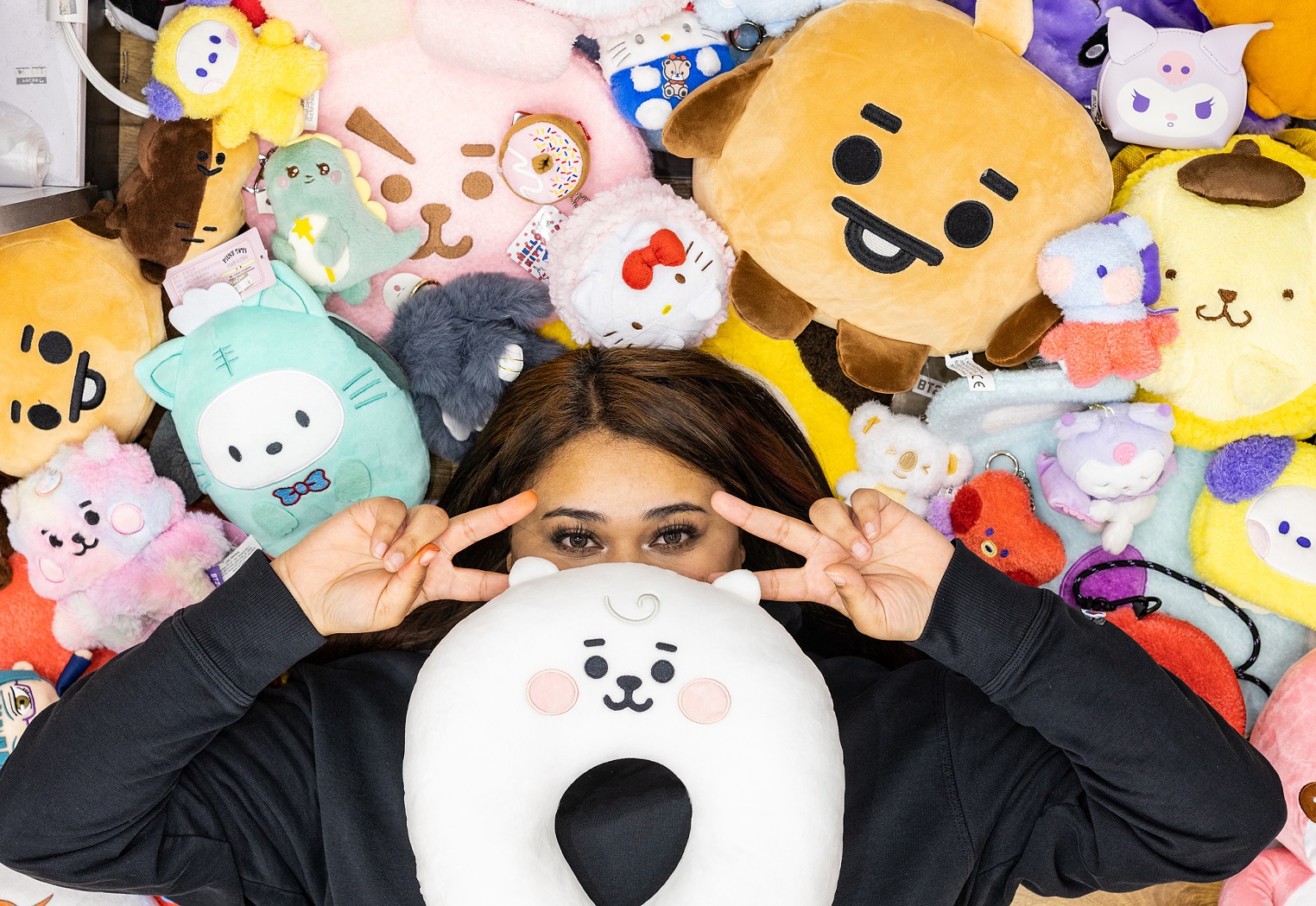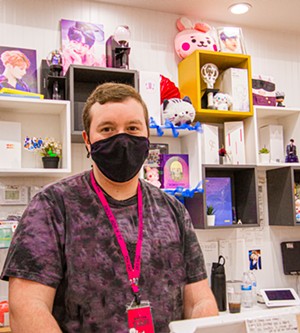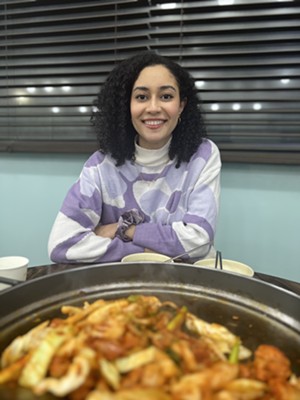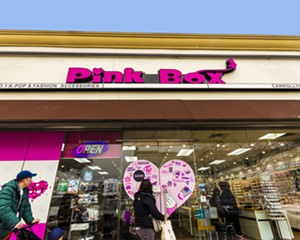Seoul Searching: Dallas Chases the Korean Dream

It’s a vibrant melting pot that draws people from across North Texas — be it the Korean-American community local to the neighborhood, or K-pop or food enthusiasts looking to get a tad closer to their dream destination.
Korean culture is having something of a renaissance at the moment. K-pop band BTS is dominating the American charts, having landed six No. 1 singles on the Billboard Hot 100. K-drama Squid Game is the most-watched Netflix series of all time with 1.6 billion hours of watch-time logged. Bong Joon-ho’s 2019 film Parasite was hailed as an instant classic upon release and became the first foreign language film to win Best Picture at the Oscars.
“Once you overcome the 1-inch tall barrier of subtitles, you will be introduced to so many more amazing films,” Bong Joon-ho quipped while accepting the award for Best Foreign Film at the 2020 Golden Globes. This tongue-in-cheek comment now reads more like a prophecy that extends far beyond prestige cinema.
Like the rest of the country, North Texans are jumping at opportunities to immerse themselves in what Korea has to offer. Special interest groups on Facebook such as “DFW Kpop” and “Asian Grub in DFDub” boast thousands of active members. K-pop groups in particular have become a resource for locals looking to buy and sell tickets and merch as well as a space to find local fan events.

A Korean culture fan, Remington Ballard loved shopping at Pink Box and now works there.
Carly May Gravley
Carrollton Koreatown has become an increasingly popular spot for these enthusiasts to lean into their interests offline. If you’re wondering if the hype surrounding Korean beauty is real, VT Cosmetics might be able to sway you. If you’re already acquainted with popular Korean dishes like bibimbap or kimchi but are wondering what’s different about how Korea does corndogs, Oh K Dog would be happy to educate you. Or if you’re a K-pop superfan looking to score some merch, you can visit one of several shops in the area that specialize in just that.
One of these shops is the aptly named Pink Box, a store that beams a rosy glow to passing shoppers, even in the daytime. It advertises itself as a fashion accessory store, and while it does have a sizable offering of jewelry, it’s the merch that catches the eye.
The store’s walls are lined with memorabilia for every K-pop group you have and haven’t heard of. Fans can browse their selection, light in its cotton candy hues yet dense in its souvenir-to-square-foot ratio, to find anything from posters and postcards to stickers and keychains with their idol’s face on it. The store maintains a loyal customer base that, according to the staff, grows every time a K-pop tour comes through North Texas.
The magnitude of fandoms represented in the shop may be overwhelming to the uninitiated, so it’s no surprise the staff are dedicated K-pop fans themselves.
“I shopped here a lot before I was an employee,” says Remington Ballard, an employee at Pink Box for the past nine months. “I knew the store and I knew a lot about the retail.”
Rose Miller, the manager on duty, chimes in: “Same thing for me,” she says. “I decided to work at this store because I shop here a lot and I like the things.”
Both Ballard and Miller have gone so far as to study the Korean language, Ballard as part of his college language credit and Miller as part of an independent club. They both wish to visit Korea one day.
Ballard and Miller are far from the only K-pop fans to take their dedication to the next level by learning the language. A recent study found that Korean is now the second-most learned language in Texas, just behind Spanish.
This isn’t the first time that a foreign country’s pop culture has captured the imagination of Americans. In the 2000s, all things Japanese were in vogue. The internet was leading to an increased availability of anime and manga series while also bringing attention to Japanese street fashion, and the music industry took note of this trend. Britney Spears released an anime-style music video for her single “Break the Ice” in 2009 and, perhaps most infamously, Gwen Stefani went through her “Harajuku girl” era, when she hired a posse of Japanese backup dancers, whom she called Love, Angel, Music and Baby after her debut solo record, to follow her around.
The singer recently referred to herself as a “superfan” with an “innocent” relationship with Japanese culture, but the sole act of renaming four real people to match the names of Stefani’s album, clothing brand and fragrances did not come across as respectful.
That’s always been a running thread when other cultures, particularly non-white cultures, trend in America. The lines between appreciation and appropriation are easily blurred.
While the Korean boom will never be fully exempt from that, there is something about it that feels different. It goes beyond music fandom into finding meaning in the culture as a whole. Your favorite K-pop boy band might inspire you to watch a K-drama. Your favorite K-drama might inspire you to try the food. The food might inspire you to learn the language, and so on.
For one Dallasite, an appreciation for all of these things inspired her to take a job half a world way.

Carrollton Koreatown offers Korean restaurants, salons, specialty groceries, gift shops and more.
Carly May Gravley
Language of Love
Zeinab Aly grew up in the suburbs of Dallas. She graduated from Plano West High School, studied business and vocal performance at Southern Methodist University and landed a highly desirable job at a “Big Four” accounting firm in downtown Dallas after she graduated. She has since left all of that behind to move to Chuncheon, South Korea, where she teaches English at a private kindergarten.
Aly was passionate about music growing up and received scholarships to study opera in college. Her parents were hesitant about her pursuing a fine arts degree and encouraged her to also study something more “practical.” She describes her career almost like a fluke, saying she simply “meandered” into business. At the time, she thought it was something she could combine with music. Aly says this was her plan before she was “beat down by the real world.”
Aly got a job in international tax consulting, working with clients all over the world on fulfilling tax law obligations for their expatriate employees. It was grueling work that required her to be available for international calls at all hours. Whether it was Germany at 2 o’clock in the afternoon or India at 5 o’clock in the morning, her life revolved around making sure companies across the globe were deducting their employees’ taxes correctly. She was having the same experience many were during the pandemic: an unhealthy work-life balance exacerbated by isolation.
“I just really didn’t know what to do,” she says of this period in her life. “I got the dream. Everyone aims for Big Four. Everyone aims for the big consulting firms. But I didn’t want to do that.”
One perk of Aly’s job was its proximity to Klyde Warren Park, where there would sometimes be a food truck selling Korean street fare. She would often grab lunch in the area, taking a minute out of her hectic day to indulge in one of her passions.

Texan Zeinab Aly was so infatuated with Korean culture, she has moved to South Korea to teach kindergarten.
courtesy Zeinab Aly
Aly had a longstanding love of Korean culture. She was an avid fan of Squid Game, BTS and stories on the Korean digital comic book service Webtoons. But her gateway drug of sorts to the culture was the food.
“I have an Egyptian-American background. My parents are immigrants and not very diverse in their palate,” she says over FaceTime. “So me and my brother would branch out and be like, ‘We really like Asian food now.’ As we got older, we were able to differentiate and say we wanted Korean food.”
Aly started frequenting restaurants in Carrollton Koreatown in high school, and during her time in college, she and her friends would camp out at Korean barbecue restaurants for hours, grazing on the food while they studied. The hours spent at these restaurants naturally made her familiar with the Korean music that was playing there, and she began looking up the songs she liked.
Though she was instantly hooked on the K-pop bands she was discovering, she felt the need to put off fully diving into the fandom. She describes this newfound interest like one would describe an unexpected romance.
“I wasn’t ready to be emotionally attached to something,” she says matter-of-factly. “I didn’t have the financial support to be able to follow these concerts and tours.”
The pandemic led to many workers questioning how much of their time and energy they should be dedicating to their jobs. “The Great Resignation” and “quiet quitting” are just a couple terms used to describe how people are re-evaluating their work-life balance. Aly was part of this movement. She quit her consulting job to find work that fulfilled her.
With her schedule suddenly clear, Aly found more time to do what she loved. And one thing she loved was learning languages. She already spoke French and Arabic and had always been fascinated by what languages teach us about foreign cultures.
At that time, her brother was an international relations major at George Washington University. When he had a foreign language requirement to fulfill, the siblings decided to learn the same language together so they could practice with each other. They had already grown up on Korean food, so diving into the language together felt like the natural choice.
Colleges in North Texas that offered Korean language classes were few, and the classes that did exist filled up quickly. Aly looked toward the Dallas Korean community for alternatives, noting that Korean people she knew had been sent to classes growing up just as her family had sent her to Arabic school. Surely, there was a local program that would take her.

Helen Kim handles a traditional Korean drum, which is incorporated into the school’s culture lessons.
Carly May Gravley
Pressure Makes Diamonds
The New Korean School of Dallas aims to teach more than a language. While classes are open to everyone, the institution was initially established as a resource for the local Korean-American community, a place where second- or third-generation immigrants, adoptees and people of mixed race could connect with their heritage.
“We’re not just teaching the language,” says board member and organization treasurer Mia Kim. “We have integrated our culture, heritage, history and also family values.”
When the school first opened, it didn’t offer adult classes. That quickly changed when organizers recognized the demand. Fellow board member and secretary Hyejin Chung notes that while Korean culture dates back thousands of years and has always had meaningful things to contribute, the social media age has allowed people from all over the world to embrace the country’s media like never before.
“The timing is right,” Chung says of Korean media dominating American pop culture. “The movies are doing great. The K-pop is doing great. Our literature is very great. I think that’s the next to go.”
And this widespread love of Korean media is driving throngs of non-Korean North Texans to take up classes.
“We have a value to deliver,” Chung says. “And in order to appreciate the value, you have to learn the language.”
For the board members of The New Korean School of Dallas, Korea’s growing cultural presence didn’t simply come out of nowhere, nor is it merely a flash in the pan. It’s the culmination of a tireless, multi-generational effort, a labor of love to show the world what they already know to be true about their culture.
Chung and Kim describe the work ethic that’s ingrained in the people of Korea, the same used across generations to proudly build up their country from scratch after it was decimated during World War II and the Korean War. Everything from their food to their technology to, of course, their pop music is imbued with an intense dedication to quality. Chung acknowledges that while Korea often presents a glamorous and aspirational lifestyle, it’s important to remember that the culture was essentially built by workaholics and perfectionists. She affectionately refers to them as “pressure-cooker people.”
What unites the “pressure-cooker people” of previous generations and the TikTok beauty influencers today is an acute awareness that this is Korea’s time. Decades of work have led to this moment, and Koreans are rising to the occasion. Boy bands may come and go, but Korea’s influence as a cultural force is here to stay.
This sentiment is echoed by Aly as she describes her experience at the school.
“Learning about the history made me understand the Korean people a lot more,” she says of the cultural values imbedded in her lessons. “Language learning brings people closer together, and I think that’s something we need more than ever.”
When describing her classmates, Aly first mentions the expected crowd: fangirls who want to understand the lyrics to their favorite songs, whom she describes as “K-pop girlies.” But she makes it clear they were far from the majority. One classmate was a man adopted from Korea as a baby, now married to a Korean woman and raising two kids, learning about his heritage for the first time as an adult. Another was a middle aged “cowboy-type” with a thick Southern drawl. The more advanced the class, the more diverse the student body.
Aly had intended for some time to teach in Korea and was preparing to take an exam that would place her in one of its public schools. Her current job at a private academy landed in her lap when her predecessor got pregnant. She had been studying for less than a year at that point and was far from fluent, but it felt like the right time to make that leap.
Nine months in, she’s more comfortable with day-to-day interactions. Though she doesn’t know what her long-term career goals are, Aly plans to teach in Korea for another year to build up her proficiency. She ironically notes that though she doesn’t have a formal degree in education, her opera training — the less conventionally practical of her two SMU degrees — gives her an advantage while teaching diction to her students.
Having now lived in Korea, Aly finds that it’s the ingenuity of the people that ultimately draws in outsiders. Foodie that she is, she uses the example of a Korean dish that gained popularity after the wars. Food was scarce at the time, and Koreans found a surplus of processed foods from the U.S. military bases. Frankfurt sausage, American cheese and Spam were recurring ingredients. The result was budae jjigae (army stew), and it’s a staple in Korea to this day. To Aly, this is just one example of Koreans always making the most of what they have: “They take a food we don’t see much flavor or meaning in and transform it.”
Army stew perfectly sums up the appeal of Korean culture and why it leads so many people past the surface level of pop culture and entertainment. It’s the unyielding commitment to quality, the mindset that can turn Spam into a delicacy or a strip mall into a vibrant cultural hub, compelling K-fans to do whatever it takes to get a little closer to it, even if it means learning a new language. Even if it means crossing the ocean.
While Chung and her colleagues at the New Korean School of Dallas aren’t surprised that the culture they love has found a broad appeal, they are flattered nonetheless.
“They are very open-minded,” Chung says of the Americans who are drawn to Korean culture. “It’s not like, ‘You’re a small country and we’re a big country so we don’t care.’ It’s not like that.”
On Jan. 13, the city of Dallas took a step toward formally recognizing its own Koreatown by installing bilingual street signs at Royal Lane and Harry Hines. This comes less than a year after a hate-motivated shooting at a Korean-owned hair salon off Harry Hines. This attack was part of the growing trend of violence and discrimination aimed at Asian-Americans since the start of the pandemic.
The Center for the Study of Hate and Extremism reported a 150% increase in hate crimes against Asians in 2020. This lead to an ongoing series of protests nationwide that have come to be known as the “Stop Asian Hate” movement.
The new street signs serve as a poignant reminder that despite those who may view it as a fad (or even as a threat), Korean culture is a permanent and positive influence on the city.
“They’re not on the other side of the world. They’re here. They’re not strangers. They’re members of our community,” Aly says about what she hopes people learn while diving into Korean culture, whether for the music, food or language. “Korean culture is here to stay. It’s not going anywhere.”
[ad_2]
Share this news on your Fb,Twitter and Whatsapp
Times News Network:Latest News Headlines
Times News Network||Health||New York||USA News||Technology||World News


